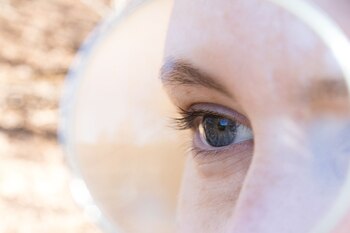
Do the eyes systematically react sensitively to light? Does the person not stand sunlight or daylight, let alone that of lamps? This may well be a symptom of an eye disease, but there may also be neurological causes. When the eyes can't stand the light, doctors define it as photophobia. “These complaints are among the most common problems associated with the human eye,” says ophthalmologist and professor Philipp Steven, from the University Clinic in Cologne, Germany. And it's not just that they find clarity unbearable. Those affected also often complain of headaches and nausea, while their eyes tear. Sensitivity to light can have different reasons. If the discomfort does not stop, then an ophthalmologist or ophthalmologist should be consulted. Different possible reasons “The incidence of light in the eye is controlled by the pupil,” says Ludger Wollring, of the Professional Association of Ophthalmologists in Germany. The pupil narrows when there is clarity and dilates when there is little light. “If this mechanism is altered, too much light can fall on the retina and you feel blinded,” he explains. Also if the cornea has been damaged, for example by too intense ultraviolet radiation, the eye usually reacts by escaping light. The same is often the case with conjunctivitis. “Severe inflammation of the iris is also often accompanied by photophobia,” says Professor Horst Helbig, director of the Eye Clinic at the University Hospital of Regensburg. In addition to pain in the eye, this inflammation often causes people to see less clearly. Photophobia with cataracts and glaucoma One can also be sensitive to light when the lens of the eye becomes cloudy as a result of a cataract. “It's a typical symptom of old age,” Wollring says. And also if you suffer from glaucoma, photophobia may appear. In the case of this condition, the optic nerve is progressively damaged, and too high intraocular pressure is one of the risk factors for developing glaucoma. According to Philipp Steven of the University Clinic in Cologne, photophobia can also occur after eye surgery or drops to dilate the pupil. With age, the eyes tend to be more sensitive to light. And the specialist adds that many people find it useful to wear sunglasses more frequently. In general, it is advisable, especially when you reach old age, to go preventively and regularly to the ophthalmologist. If sensitivity to light occurs suddenly and intensely, you should see a doctor, as long as these complaints do not disappear after a few hours. Wollring indicates that if, in addition, other symptoms, such as redness of the eyes, aches or tearing, are added, you should go to the ophthalmologist. Is it temporary or long term? Whether photosensitivity is temporary or remains for a long time will depend on the cause that causes it. It often occurs only in a temporary way. A damaged cornea, for example, can heal in a few days. A migraine attack passes more or less quickly. And clouding of the lens as a result of a cataract can be treated by surgery. “In very rare cases, sensitivity to light becomes a lasting problem,” Wollring points out. For example, if you suffer from an aniridia. Aniridia is defined as the partial or total absence of the iris. Also, albinos often react sensitively to light.
Due to the presence of the cataract, the light is no longer concentrated enough, but is scattered more, so that, in low light conditions, those affected feel more easily blinded.
Also, dry eyes from many hours in front of a monitor screen may be another possible reason for light sensitivity. The same goes for migraine and other neurological diseases.
But there is not always a cause of photophobia that requires treatment. “It is completely normal for the eye's sensitivity to light to increase over the course of life, over the years,” says Helbig.
dpa
Últimas Noticias
Debanhi Escobar: they secured the motel where she was found lifeless in a cistern
Members of the Specialized Prosecutor's Office in Nuevo León secured the Nueva Castilla Motel as part of the investigations into the case

The oldest person in the world died at the age of 119
Kane Tanaka lived in Japan. She was born six months earlier than George Orwell, the same year that the Wright brothers first flew, and Marie Curie became the first woman to win a Nobel Prize

Macabre find in CDMX: they left a body bagged and tied in a taxi
The body was left in the back seats of the car. It was covered with black bags and tied with industrial tape
The eagles of America will face Manchester City in a duel of legends. Here are the details
The top Mexican football champion will play a match with Pep Guardiola's squad in the Lone Star Cup

Why is it good to bring dogs out to know the world when they are puppies
A so-called protection against the spread of diseases threatens the integral development of dogs




